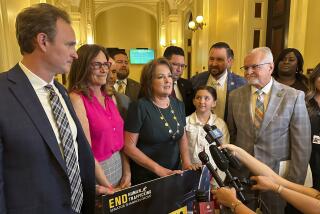$50-Billion Tobacco Tax Break Rejected by Senate, 95-3
- Share via
WASHINGTON — By a lopsided margin, the Senate killed a $50-billion tax break for cigarette makers Wednesday, dealing a blow to the powerful tobacco industry and to what Sen. Susan Colins (R-Me.) called an “outrageous example of back-room politics at its worst.”
The one-sentence, 46-word provision bestowing the tax break had been written by a tobacco lobbyist--and then quietly appended to a giant tax bill by House Speaker Newt Gingrich (R-Ga.) and Senate Majority Leader Trent Lott (R-Miss.).
The loophole would have amounted to $50 billion over 25 years by reducing the financial exposure of tobacco manufacturers stemming from the proposed $368.5-billion legal settlement between the industry and 39 states.
After sporadic floor debate spanning two days, the outcome of Wednesday’s vote was a foregone conclusion. Ninety-five senators, including Lott, voted to repeal the tax break; the only three votes in favor of the measure were by Mitch McConnell (R-Ky.), Jesse Helms (R-N.C.) and Lauch Faircloth (R-N.C.).
The vote was especially high-profile because it joined two of the most prominent controversies pending on Capitol Hill: whether to approve the national tobacco settlement and whether to enact campaign finance reform.
With the unfolding revelations of fund-raising improprieties by both parties, the spotlight increasingly has been turning to the influence of powerful special-interests, such as big tobacco--which made nearly $10 million in campaign contributions during the 1995-96 election cycle, according to Common Cause.
Adding to the drama was the role of two first-year senators who led what became an anti-tobacco stampede: Collins and Richard Durbin (D-Ill.).
Durbin, a former congressman, was 14 when his father, a smoker, died of lung cancer. Collins, a novice politician, has quickly become known as a champion of “good government”--to the point of defying Lott by co-sponsoring a major campaign finance reform proposal.
The tobacco tax break controversy’s roots go back to a 15-cent-per-pack increase in the federal cigarette tax, which Congress adopted this summer as a part of the balanced budget deal. The projected $24 billion in revenues over five years were earmarked for providing health coverage to millions of uninsured children.
Meanwhile, the agreement between cigarette makers and the attorneys general of 39 states and Puerto Rico called for the tobacco industry to fork over $368.5 billion to settle the lawsuits filed by those jurisdictions.
The ensuing tax break for cigarette makers would have allowed the industry to defray the cost of that settlement by $50 billion in revenues from the 15-cent-per-pack tax increase. Among those who strenuously opposed the provision were the state attorneys general who negotiated the tobacco settlement.
Collins called the tax break “a $50-billion giveaway to big tobacco,” and said it represented “the kind of abuse of the legislative process that the American public is rightfully sick and tired of.”
Durbin argued the case with equal dashes of outrage and sarcasm--calling the the provision “a legislative orphan [with] . . . no fathers, no mothers, no living relatives.”
And quoting the words of John Randolph, a 19th-century Roanoke, Va., congressman, Durbin said the tax break “shines and stinks like rotten mackerel by moonlight.” (Randolph had applied that phrase to an adversary.)
Lott and Gingrich had added the tax break to the 327-page tax measure--with no debate or public hearing--under a section entitled “Technical Amendments Related to Small Business Job Protection and Other Legislation.”
The tax bill was part of a huge five-year balanced budget that Congress enacted and President Clinton signed into law on Aug. 5.
For weeks thereafter, the origins of the tobacco tax break remained a mystery. But on Aug. 29, USA Today quoted Kenneth Kies, staff director of the Joint Committee on Taxation, as saying that the provision was authored by a tobacco lobbyist. The newspaper also reported that Lott and Gingrich insisted on the provision’s inclusion in the budget bill, and that the White House had agreed.
Durbin discovered the provision only hours before the July 31 budget vote, and was unable to mount a meaningful drive to kill the provision.
But since then, and especially this week, the measure had become such an embarrassment that no senator spoke specifically in favor of it.
In fact, according to Durbin, the Republican majority offered to repeal the loophole on an anonymous voice vote. But Durbin insisted on a recorded, roll-call vote to demonstrate the strength of the sentiment in the Senate against the measure.
Its repeal came as an amendment to the appropriations bill for the departments of Labor and Health and Human Services, one of 13 annual funding measures that must be approved by Oct. 1, the start of a new fiscal year.
The House also is debating its own version of the funding bill. And Rep. Nita Lowey (D-N.Y.) said she too intends to force a recorded vote on repealing the tobacco tax break.
But faced with markedly different rules than those in the Senate, the best Lowey and her allies can hope for may be to force a vote on whether to “instruct” House conferees to adopt the Senate’s position. Senate-House conferences are routinely held to iron out differences in otherwise similar legislation.
Before the tax break’s repeal, the Senate agreed to an amendment by Sen. Jeff Sessions (R-Ala.) to limit the fees of all lawyers involved in the tobacco litigation. Sessions said he was outraged by the “windfall” the lawyers may reap--up to $100 billion, he said.
Sessions’ amendment would limit such fees to $250 an hour and to no more than $5 million per state overall.
But his amendment was rendered virtually feckless because the Senate also approved a provision offered by Sen. Paul Wellstone (D-Minn.) to exempt from the fee caps all the states involved in the tobacco settlement.
Wednesday’s action was the Senate’s second anti-tobacco vote this month. Last week, reversing itself, it approved $34 million sought by the Clinton administration to help curb cigarette sales to under-age customers.
More to Read
Get the L.A. Times Politics newsletter
Deeply reported insights into legislation, politics and policy from Sacramento, Washington and beyond. In your inbox twice per week.
You may occasionally receive promotional content from the Los Angeles Times.










